The flags appear before I even hit the Georgia state line, most of them poking up in pairs from the tops of car windows. All are red and black, some emblazoned with a G, others with bulldogs, and a few newer ones displaying the words “2017 SEC Champions.” It is Tuesday, January 2, the day after the Georgia Bulldogs outlasted the Oklahoma Sooners in a double-overtime Rose Bowl already being called one of the greatest games of all time. Now, here on I-75 right around Chattanooga, Tennessee, the highway is dotted with Bulldogs fans returning home. Many, I imagine, are heading back to their real lives after spending the holidays here or parts farther north. I wonder, though, if any others are like me.
I’m a Georgia fan who grew up in the state but hasn’t lived there since I was 16. I carried my devotion to the Dawgs to other homes around the country: Pennsylvania, California, Tennessee. But after the finish of a Rose Bowl that still exists in my memory as a dream—red helmets bathed in Pasadena’s sunlight, a senior running back named Sony Michel bursting through the line and into history, a true freshman quarterback named Jake Fromm ending the evening with a rose clenched between his teeth—I found myself eager to get on the road back home.
Monday night in Atlanta, Georgia will play Alabama for the College Football Playoff national championship. A win would give Georgia its first title in 37 years. For Alabama, who beat no. 1 Clemson in their semifinal in the Sugar Bowl, it would be its fifth championship in nine years and its 17th overall. The game matches two SEC schools with a national championship on the line for the second time this decade, and it pits Georgia coach and former Bama defensive coordinator Kirby Smart against his longtime mentor, Nick Saban, who has never lost to a former assistant.
In the buildup to Monday, I crisscross the state and listen to people talk about the Bulldogs. I hear from high school coaches who helped mold All-American linebacker Roquan Smith and star running back Nick Chubb; schoolmates who bore witness to Fromm’s prodigious talents; students unable to believe they get to be on campus for Georgia’s shot at its first national championship since the 1980 season; and fans who have spent their entire lives wondering when a day like Monday would finally arrive.
Tuesday
Atlanta, Georgia
The College Football Playoff logo is everywhere you look in downtown Atlanta. It’s on street signs and on flyers in bars, projected onto the side of the towering Westin and pinned to the shirts of some of the workers inside the hotel. We’re still a few days from fans swarming this area on game night, but even now, Atlanta feels ready to host.
I grew up in the city’s suburbs, in Gwinnett and Cobb counties, the child of parents who cared little about sports. As a middle schooler surrounded by Georgia Tech fans, I decided to adopt the Dawgs. My love for the team grew when I moved to Philadelphia at 16, Saturdays on CBS serving as a portal back to the state I considered home. There, I sat alone in my bedroom and watched a freshman quarterback named David Greene toss a touchdown pass to Verron Haynes to beat Tennessee. This was Mark Richt’s first year in Athens, his arrival announced with a win over a Vols team ranked sixth in the country, and the moment was instantly immortalized by Larry Munson’s “hobnail boot” call.
Later, as a college student studying abroad, I spent chunks of multiple Saturday nights at internet cafés in Spain, refreshing box scores as Georgia marched to the SEC title in 2005. As a grunt in a Chattanooga newsroom in 2007, I watched Knowshon Moreno and Matthew Stafford electrify the SEC while I laid out pages for the Sunday paper. As a broke freelance writer in 2011, I questioned my life decisions while sitting at home in California on a Tuesday just so I could watch five-star recruit Isaiah Crowell lift a bulldog puppy to announce his signing with the Dawgs.
Through all those years, though, I learned that to be a Georgia football fan was to hope and to suffer. The script was the same. Outrageous talent, flashes of brilliance, and always, in the end, failure. Year after year, the Bulldogs brought in top-10 recruiting classes and sent stars to the NFL. Rivals won national titles—most painfully, archrivals Tennessee, Florida, and Auburn, not to mention fellow SEC powers Alabama and LSU—but even when Georgia won the conference, it always seemed just a hair below the level needed to win the whole thing. I allowed myself some optimism when the Dawgs were ranked no. 1 in the 2008 preseason. Then I vowed never to hope again as I watched as a team that featured future Pro Bowlers Matthew Stafford, A.J. Green, Geno Atkins, and Justin Houston, along with star running back Knowshon Moreno, somehow finished 10-3.
So in 2012, when my father-in-law, an Alabama fan, offered to take me to see the Dawgs play the Tide in the Georgia Dome for the SEC championship, I wanted to turn him down. I knew exactly how this would end. I couldn’t bear the pain.
And yet: What if I was wrong? I flew to Birmingham, Alabama, and rode with him the three hours to Atlanta, and we stopped at a Waffle House where I listened to him say, “I think Georgia really has a chance,” among other beautiful lies. The Dawgs were, in fact, loaded: Aaron Murray under center and Todd Gurley behind him, Alec Ogletree and Jarvis Jones leading the defense. We arrived at the Dome, where I sat in a sea of Crimson and watched Georgia take control; I told myself that hope was futile, that the 21-10 lead was a ruse. It was. Alabama stormed back and took a 32-28 lead with about three minutes remaining. I told myself the game was over, even as Murray started marching Georgia back down the field. I continued to quell my own rising belief when he hit Tavarres King on a 23-yard strike to get Georgia into Bama territory. But when Murray connected with Arthur Lynch over the middle of the field, dragging defenders with him to the 8-yard line with only seconds left, my resolve broke. For the first time all night, I allowed myself to hope.
This was, of course, monumentally fucking stupid. Instead of spiking the ball to stop the clock, Murray threw a tipped pass that fell into the arms of Chris Conley, who was tackled at the 5, running out the clock and ending the game. As always, for Georgia fans, hope only led to suffering. My father-in-law is a lifelong teetotaler, but later that night, he bought me a beer. He went on to celebrate a national title that year, one of four in the past decade.
I have not spoken to my in-laws this week. Nor do I plan to. They are wonderful people and I love them very much and on Monday night I hope they experience deep pain.
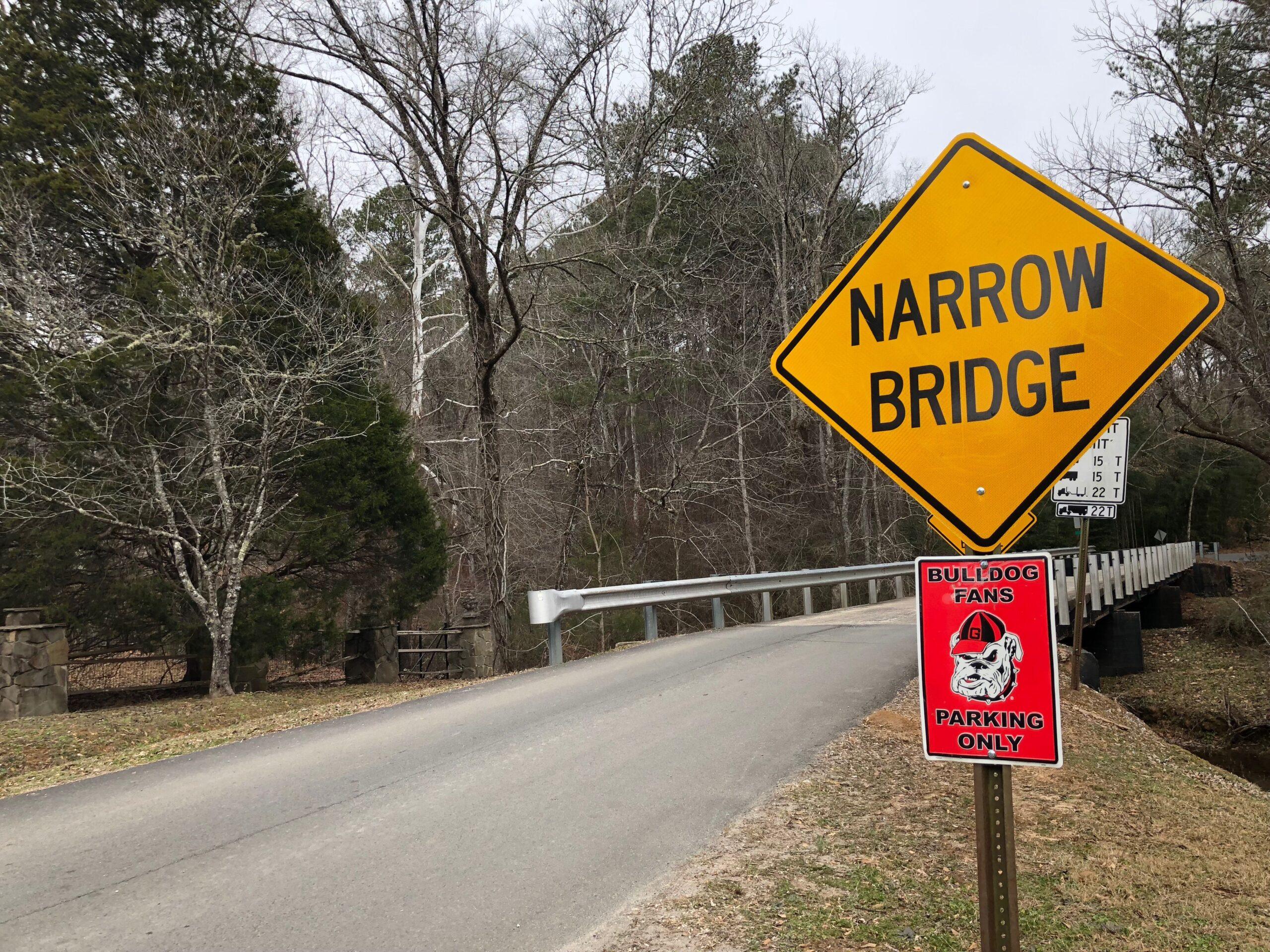
Wednesday
Chubbtown, Georgia
Miles Driven From Atlanta: 82
This place doesn’t look like much. There are a few houses and a few more trailers, narrow roads that wind through hills, and, at least on this morning, more deer than cars. Driving in from the east on Duke Road, I first hit Chubbtown Road and then Chubb Drive. Soon though, Chubbtown Road changes names. Around a bend, it becomes just plain Chubb Road. Up the street near the creek sits the town’s largest building: Chubb Chapel United Methodist Church. The church has a few dozen members. One of them happens to be a running back. His name is Nick.
I never knew that one person could be so dominant.Cedartown High football coach Doyle Kelley on Nick Chubb
Senior Nick Chubb has rushed for more yards than any Georgia running back not named Herschel Walker. As a backup to Gurley, Chubb ran over and through Clemson’s entire defense in Week 1 of his freshman season in 2014, and he has continued bowling past defenders—vision impeccable, legs an endless churn—in the years since. After tearing knee ligaments in a gruesome injury against Tennessee as a sophomore, Chubb returned to lead the team in rushing as a junior. Then, rather than going to the NFL, he and his backfield mate Michel both returned to lead Georgia to an SEC title as seniors.
Chubb’s roots trace back to the founding of this unincorporated community, a settlement of free African Americans established in the mid-19th century and named for its founder, Chubb’s ancestor John Henry Chubb. Once, according to Georgia site DawgNation, this place was home to its own school and post office, a couple of mills, and a cotton gin.
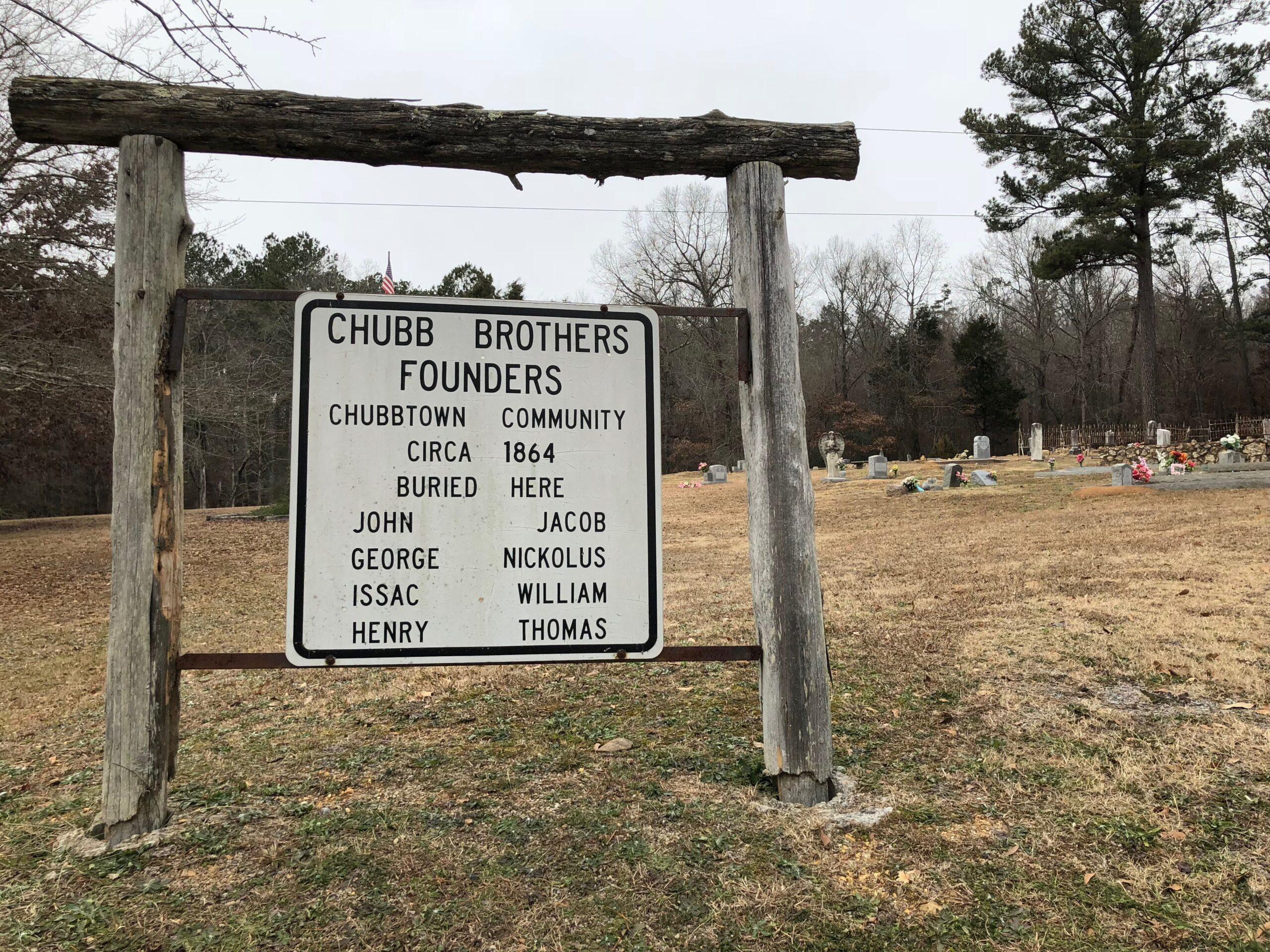
Chubb comes back here in the summers, running through the hills and performing superhuman acts in the weight room at his alma mater, nearby Cedartown High. “He is a sight to behold,” says Cedartown football coach Doyle Kelley, who has worked at Cedartown for 32 years and became head football coach last January. “I have seen him do things I can barely believe.” Last summer, a video of Chubb squatting 600 pounds flew around the internet, a ridiculous display of strength from the nation’s most powerful back. In high school, unbound by the restrictions of an elite college program’s strength staff, Chubb topped even that. He set a state record, squatting 700 and benching 365.
Kelley remembers watching Chubb run through defenders as if they were gnats, sometimes seeking out contact just to entertain himself on the way to the end zone. “I never knew,” Kelley says, “that one person could be so dominant.”
Chubbtown remains enthralled. It sits less than 10 miles from the Alabama border, and there’s plenty of crimson and white peppered among the red and black around town. One man, though, tips the scales heavily in the Bulldogs’ favor. “Oh, we just love Nick,” says a woman named Hayley who works at Lively’s BBQ and Breakfast, where Chubb can sometimes be spotted on summer Saturday mornings. Down the road at Bojangle’s, instead of advertising chicken, the sign in the parking lot boasts “Chubbtown,” just above the number 27, which Nick wears for UGA.
“He’s our boy,” says Kelley. “Seeing him succeed is just really special for us. He’s living out a dream. He really is. And hopefully on Monday night that dream will become even more real.”
Thursday
Montezuma, Georgia
Miles Driven From Chubbtown: 209
The road to Roquan Smith’s hometown passes through cotton fields and peach orchards, the flat earth of central Georgia a seemingly endless expanse. The first time Larry Harold drove down here, when he was set to interview for a coaching job at Macon County High, he told his wife, “There’s no way I’m living in this place.” Then he arrived in town and started talking football. By the end of the day, his mind had changed.
“The one thing you can say about Montezuma,” says Harold, “is that those people love—love—their football.” A town of about 3,000 people that seems to shrink with every census, Montezuma has a poverty rate more than double the country’s as a whole. In the middle of town, there’s a Huddle House, a Dollar General, and across the street from the McDonald’s, there’s Adams-Maffett Field, home of the Macon County Bulldogs. “On Friday nights,” says Harold, “that’s where you’ll find every single person in the whole town.”
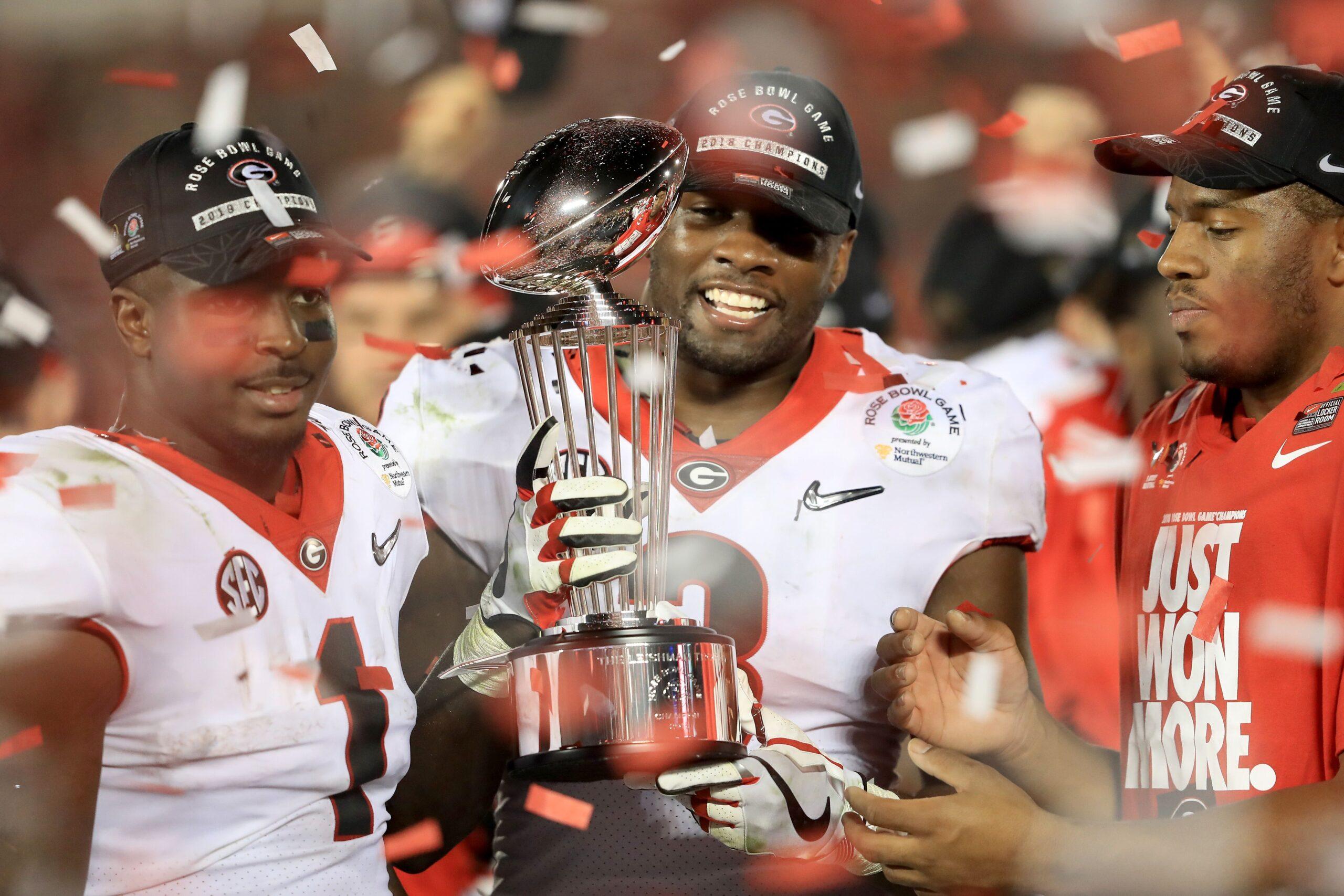
From 2012 to 2015, that’s where you’d find Harold coaching Smith, the current Georgia linebacker who seemed to single-handedly turn the momentum of the Rose Bowl in the second half, flying sideline to sideline to stand up ball carriers and snuff out potential big plays. A junior, Smith finished 10th in the Heisman voting and became the unquestioned leader of a defense that ranks sixth nationally in yards allowed per game.
Back here in Montezuma, Harold says, the two-way star would spend pregame warm-ups dunking the ball over goalposts, then go out and score in every manner possible—on the ground and through the air, on returns of interceptions and fumbles, even running back the occasional punt. One game, Harold says Smith finished with 30 tackles. Another, Harold says he had 24 tackles and rushed for 256 yards. When colleges came calling, Smith leaned toward UCLA, which had been the first school to offer him a scholarship.
One by one, he’s doing everything he said he would. He’s speaking these things into existence.Macon County High football coach Larry Harold on Raquon Smith
Harold remembers Smith’s signing day ceremony, the gym at Macon County High packed with people from all across town, even the local Mennonite community, all wearing red and black. “We were blown away,” says Harold of the locals’ showing. Smith announced he was signing with UCLA, but because he knew the coach who had recruited him might be leaving for a job in the NFL, he never sent in his letter of intent. The coach, Jeff Ulbrich, officially left the Bruins for the Atlanta Falcons, and Smith signed with Georgia several days later.
Now, CBS ranks him as the top linebacker prospect in the country, a potential top-five pick in the 2018 NFL draft. “I’m not surprised by any of this,” says Harold. “This is a guy who had everything mapped out from when he was a freshman in high school. He was going to be all-state. Then he was going to go to college, become an All-American, get a degree, go to the NFL. And one by one, he’s doing everything he said he would. He’s speaking these things into existence.”
Thursday
Warner Robins, Georgia
Miles Driven From Montezuma: 40
Just up the road, the town of Warner Robins sits next to an Air Force base, full of manicured lawns and multilevel homes. On the south side of town, there’s an expanse of small baseball diamonds, home to Warner Robins American Little League. Or, as Georgia quarterback Jake Fromm used to simply call this place, “the ball fields.”
“Every single day, we’d come down here to the ball fields,” says Josh Goodman, who played little league with Fromm. “It didn’t matter if we had practice or a game. We’d ride our bikes here or get dropped off, and we’d play wall ball or tennis baseball or just hang out in the bleachers. This was it.”
It was here, Goodman remembers, that Fromm would blast pitch after pitch over fences; he once threw so hard in warm-ups that the ball tore straight through Goodman’s glove. Together, they helped lead Warner Robins to the Little League World Series in 2011: Goodman a contact-hitting catcher, Fromm a big-armed and heavy-batted do-everything player who floated from short to first to the mound. Only 13, he already threw 80 miles per hour, Goodman says. In the batter’s box in Williamsport, Pennsylvania, anytime he made contact his teammates thought the ball had a chance to clear the fence. “Everything,” says Goodman, “seemed so easy for him.”
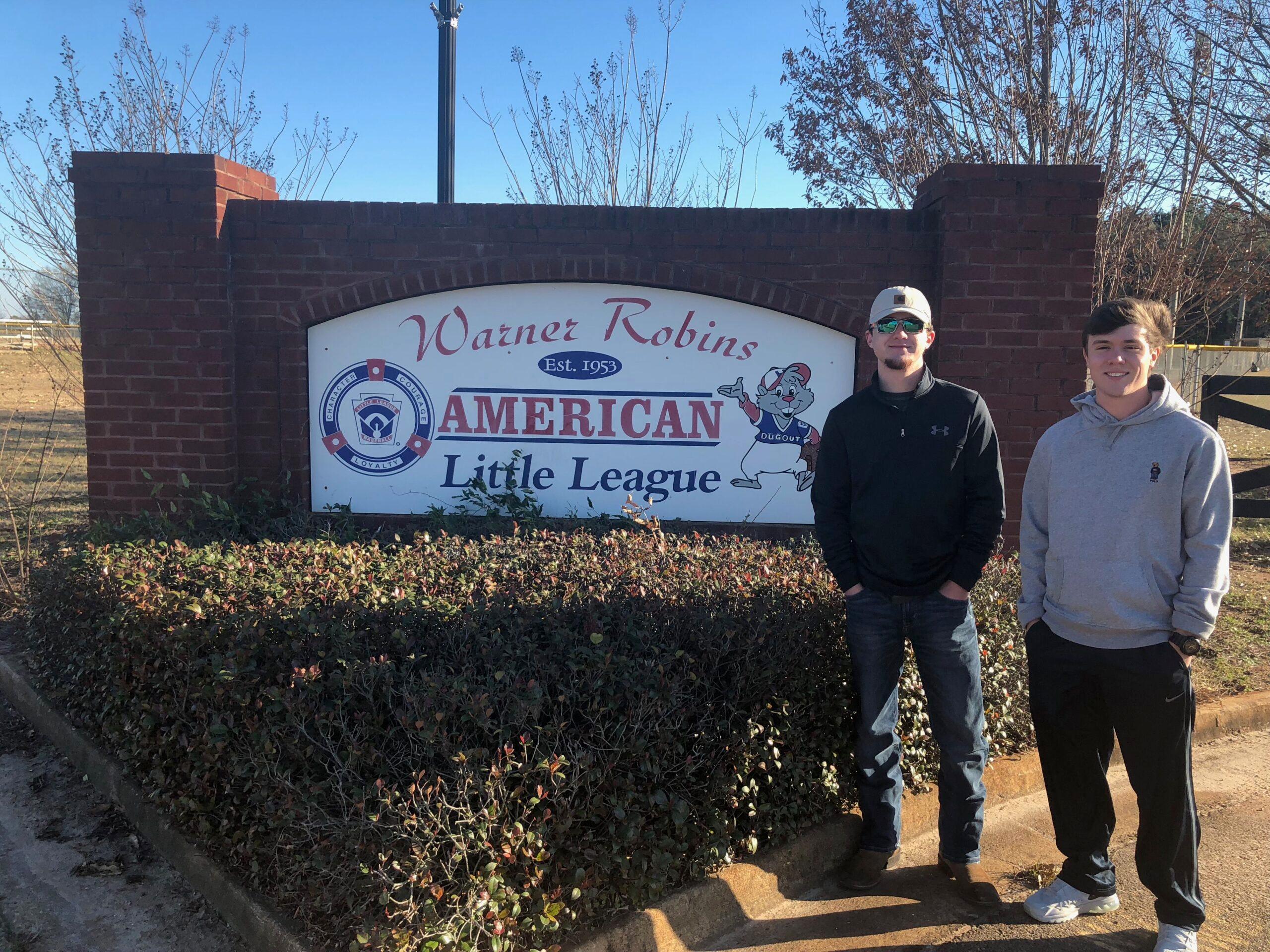
Even off the field, Fromm stood apart. Says Layton Sheets, who led the student section at Fromm’s alma mater, Houston County High School: “He was that star player who was always thinking about everyone else.” Sitting in my rental car in the parking lot of the ball fields, Goodman pulls out his laptop and cues up an audio file of a press conference in Williamsport. He listens to himself stumbling over a few words, trying to address reporters more than twice his age, and he laughs. “Now,” he says, “listen to Jake.” Soon Fromm’s pubescent tenor voice is squeaking through the laptop’s speakers, giving credit to his teammates and spouting the clichés of a 10-year pro. Says Goodman: “It’s like he already knew how to be in the spotlight.”
They say he’s not a normal freshman. Well, when he was a 12-year-old he wasn’t a normal 12-year-old. When he was a 13-year-old, he wasn’t a normal 13-year-old. He’s always been that way.Layton Sheets on his former classmate Jake Fromm
Goodman remembers making the last out in the team’s final loss and walking off the field, Fromm’s arm draped around his shoulder. Together, they lingered in the dugout for a while, arms around each other, devastated. He’s thought about that moment when hearing the stories that come out of Athens, about how the force of Fromm’s personality has enabled him to grab command of the locker room in his first year on campus. Originally an Alabama commit, Fromm flipped to Georgia soon after Smart took the job. He arrived in Athens expected to sit behind former five-star recruit Jacob Eason, Georgia’s starting quarterback in 2016. After Eason went down with a knee injury in the 2017 season opener against Appalachian State, Fromm took command of the team and never gave it back. Though Georgia’s offense has been led by its eighth-ranked ground game, Fromm has emerged as one of the nation’s most efficient passers, ranking fourth in the country with a QB rating of 166.4.
Says Sheets: “They say he’s not a normal freshman. Well, when he was a 12-year-old he wasn’t a normal 12-year-old. When he was a 13-year-old, he wasn’t a normal 13-year-old. He’s always been that way.”
Though Goodman grew up a Georgia fan, he now attends Georgia Tech. Sheets, a student at Mercer, also pulls for the Yellow Jackets. On Monday night, they both say it will be difficult to pull for the Bulldogs. Instead, says Sheets, “I’m just pulling for Jake.”
Friday
University of Georgia campus; Athens, Georgia
Miles From Warner Robins: 110
Here at the Tate Student Center, the supposed “living room” of Georgia’s campus, there are red-and-black beanies and red-and-black hijabs. There are Georgia logos on hats and on T-shirts, on wallets, on loafers, on bare skin. There are Chubb jerseys and Michel jerseys and the jerseys of lesser-known players such as receiver Mecole Hardman and defensive back J.R. Reed. Then there are a few throwbacks: Gurley, A.J. Green, Walker. One student is wearing a no. 16 jersey from the mid-’90s, stitched with the name of a safety who played in that era: Smart.
And sitting in the middle of the commotion, there are two students wearing no Georgia gear at all. Kelsey Russo and John Durham both work as sports editors at The Red and Black student newspaper. Both attempt, with varying degrees of success, to view the team as journalists rather than as fans. “It can be hard,” says Russo, an Ohio native who came to UGA for its combination of big-time athletics and a respected journalism program. “Sometimes it can be really hard.”
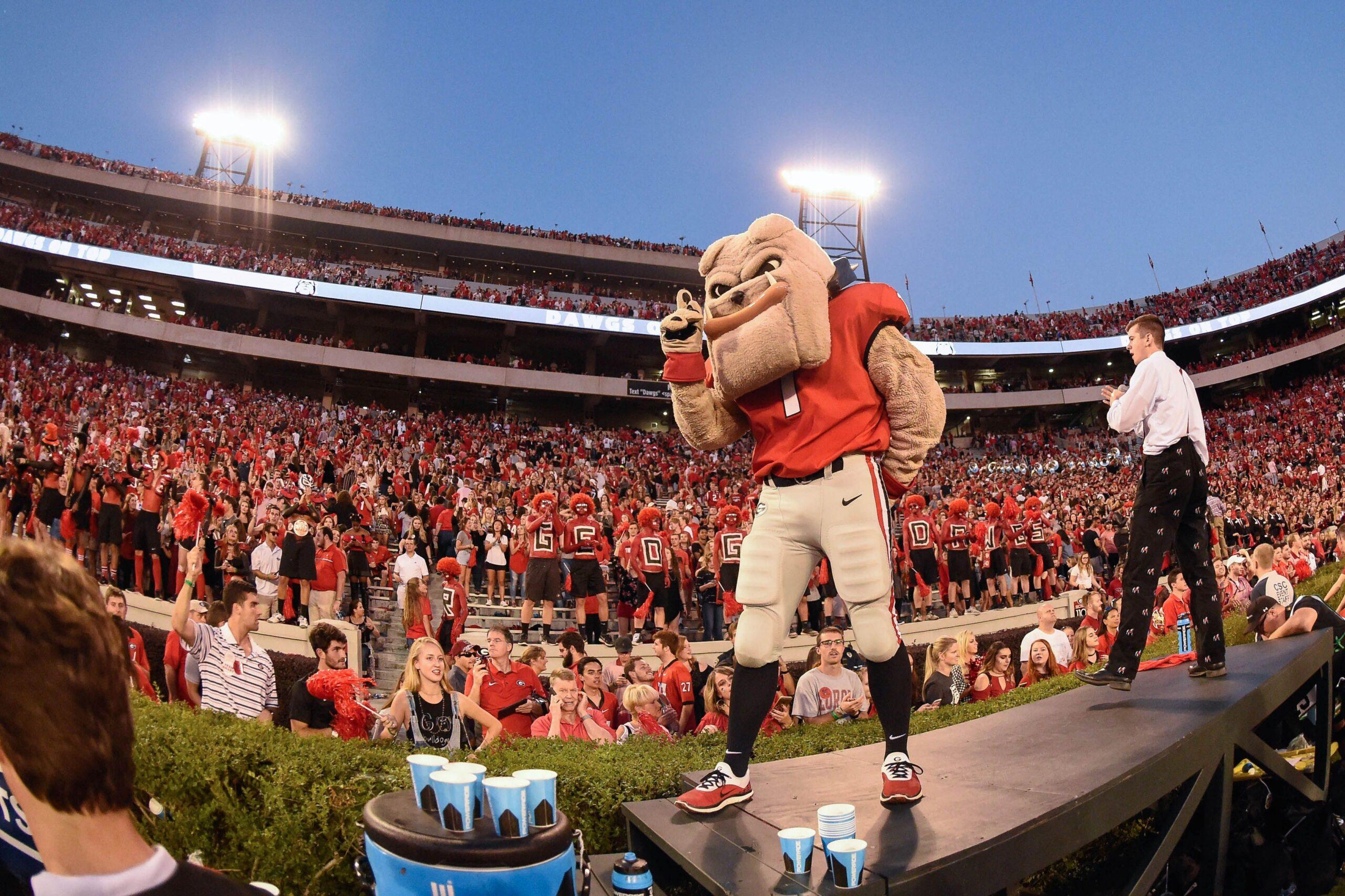
Even on this campus, Russo says, the cycle of hope and suffering is ingrained in students’ heads. “All season,” she says, “all I heard going into every big game was people saying, ‘This is going to be the game where we finally blow it.’ It was just expected.” And yet, somehow, the Bulldogs never have. Even a 40-17 loss at Auburn feels now like a blip, their only loss later avenged in the SEC Championship Game with a playoff berth on the line. Now, the energy around campus feels different than it has in years. Says Durham, who grew up a Georgia Tech fan: “I think the sense of excitement really started to grow after Kirby Smart got hired. Even though a lot of people didn’t want [former Bulldogs coach] Mark Richt to lose his job, Kirby Smart brought this energy.” Even last season, when Georgia stumbled to an 8-5 record in Smart’s first season, Durham says, “There was just this sense that things were starting to change.”
For student sports editors, business is good. No one knows better than college journalists that print media is quickly dying. “Normally,” says Russo, “we have to almost beg people to take a paper. We’re like pleeeeeease.”
After the Rose Bowl, though, The Red and Black put out a special edition. “It was insane,” says Durham. “We would be filling up the newsstands, and there’s this line of people, all trying to get a copy.” They filled orders for fans and alumni coming from as far away as California and Hawaii. (The demand for papers pales in comparison to the demand for tickets. With the game only 70 miles from campus, Georgia fans crashed StubHub’s site after the Rose Bowl and have driven prices well above $2,000.)
All season all I heard going into every big game was people saying, ‘This is going to be the game where we finally blow it.’ It was just expected.Red and Black editor Kelsey Russo
After the national championship game, they’re planning another special edition. If Georgia wins, Russo says, “I think we’re ordering 20,000 copies.” If the Bulldogs lose, it will be closer to 2,000. Monday night, they’ll both be in the Athens newsroom, managing their staff’s coverage from Atlanta. While they may drift back and forth between the roles of fan and journalist, says Durham, “Just being a part of this season, being here for it and helping to cover it, is an amazing thing. It’s been so, so long.”
Friday
Southeast Athens, Georgia
Miles From UGA campus: 5.2
The last time Georgia played for the national championship, on January 1, 1981, Trent Woods was an infant in the hospital. Woods’s grandfather Lonnie made the trip to New Orleans to see the Bulldogs play Notre Dame in the Sugar Bowl, though. Lonnie Woods had been a bus driver for the team, driving the defense to away games. He’d joked with then-defensive coordinator Erk Russell that he should paint a bulldog on his head. Russell declined, but on that day in New Orleans, Lonnie decided to have a UGA art student paint his own bald dome.
Thus began a family tradition. Lonnie wore the head paint to every Georgia game, along with a red jacket, a black tie, and a white shirt. Trent remembers sitting in his grandfather’s lap at Sanford Stadium as a small child, cheering on the Dawgs while being careful not to mess up his grandfather’s paint. When Lonnie died in 1986 his son, Mike, took on the tradition as his own, traveling the country wearing a painted bulldog on his head.
Trent knew Mike as a generous and adoring father, a man who worked hard to provide for his family and who, Trent says, “More than anything, just taught me how to love.” The rest of the country, though, knew him as “Big Dawg,” one of the most famous college football fans in the nation. Nearly every Saturday, cameras would catch him in the stands cheering, usually in a red shirt and black overalls. In and around the stadium, Mike would get mobbed by fans of both the Bulldogs and their opponents, all asking for pictures. “I see all these pictures of people with my dad,” says Trent, “and I think I probably took about 70 percent of ’em. I remember starting with the wind-up disposable cameras, then moving on to the fancy digital cameras, the Polaroids, the flip phones, the iPhones, everything. I became a master at taking pictures for strangers.”
Trent went with his dad to every home game in Athens and often on the road. On occasion, they would paint their heads together. One afternoon in Knoxville, Trent forgot sunscreen and came back home with the outline of a bulldog burned into his skin. Mostly, though, Trent just came along to cheer on the Bulldogs and watch his father engage with other fans. “He loved it,” Trent says. “To him there was nothing better than just laughing and talking with other fans on Saturdays.”
Trent and his father long ago decided that he would take over the role of “Big Dawg” after Mike died. “People used to ask me if I looked forward to carrying on the tradition,” he says. “And I would tell ’em ‘No.’ Because if I’m carrying on the tradition, that means he’s gone.” Mike began painting his head near the end of Vince Dooley’s reign as head coach in Athens. He served as “Big Dawg” through the Ray Goff era and Jim Donnan era and for all 15 seasons under Mark Richt. In 2016, he wore the Bulldog on his skull each game for the team’s first season under Smart.
And then, on January 4, 2017, Trent got a call from his sister. Their father had suffered a heart attack. He was dead.
The Rose Bowl was the same kind of deal. That was one of his dreams, to go see the Dawgs play there. Getting to be there, and not having him there, too—it was just overwhelming.Trent Woods on his father, Mike “Big Dawg” Woods
Nine months later, before Georgia’s season opener against Appalachian State, Trent sat outside Sanford Stadium as his mother painted his head. He walked up the steps into the stadium, and he heard fans behind him cheering. “I was wondering what was going on,” he says. “I thought Georgia had done something. But I turn around and realize they’re all looking at me. Right then and there, I just started bawling.”
For Trent, this season has been filled with moments of sublime joy cut by searing pain. After the Bulldogs won the SEC championship, he stood in Mercedes-Benz Stadium, elated. He knew what his father would do: He would head down near the field to show off his head for the cameras. But Trent couldn’t do it. In his team’s moment of greatest triumph, he carried with him a sense of loss. “The Rose Bowl,” he says, “was the same kind of deal. That was one of his dreams, to go see the Dawgs play there. Getting to be there, and not having him there, too—it was just overwhelming.”
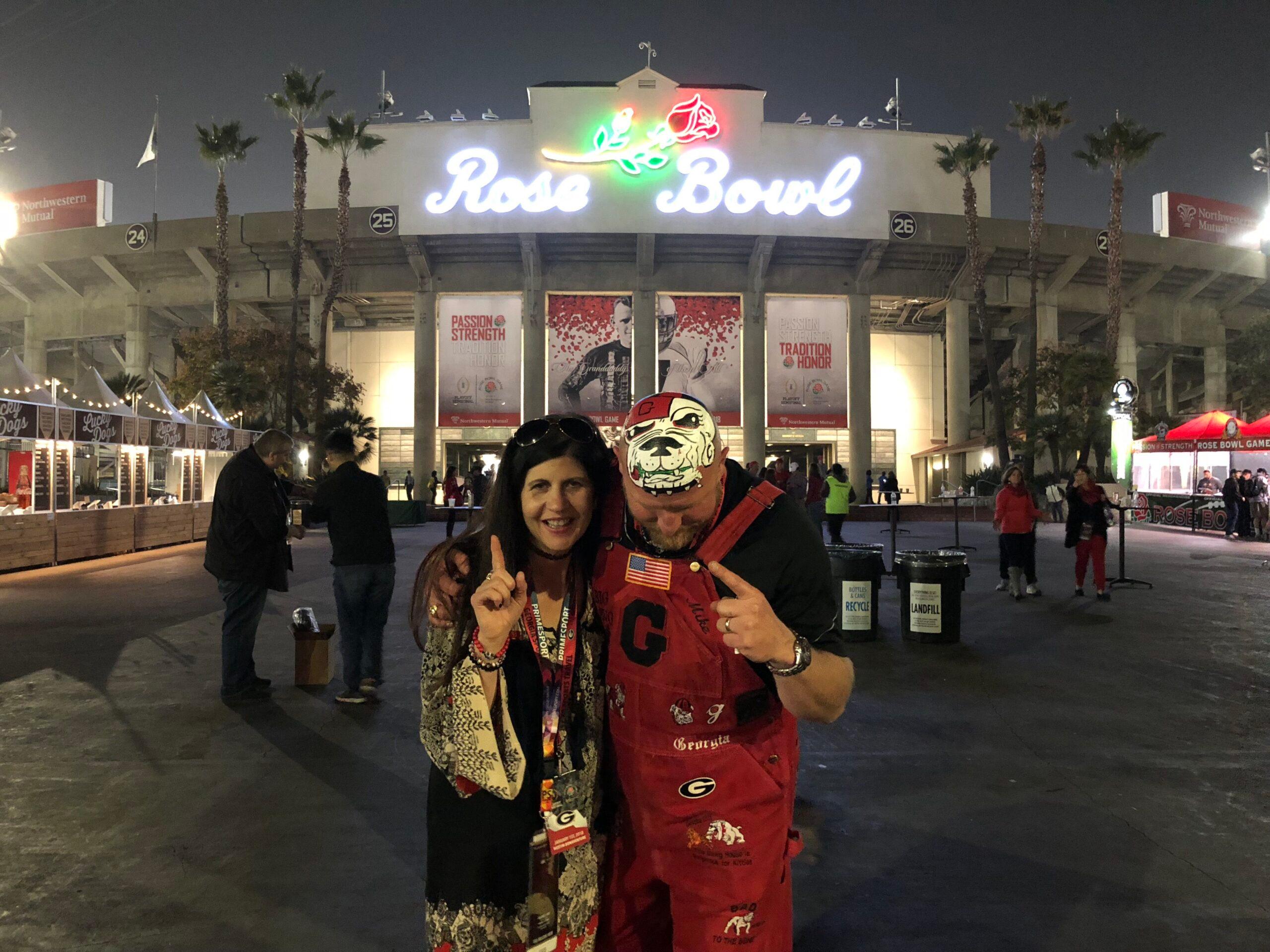
Monday night, Trent will be there in Atlanta, watching the Bulldogs take on the Tide. He will think about his father, and about his grandfather before him, the man who started the head-painting tradition the day Georgia last won it all to cap the 1980 season. “It’s going to feel pretty surreal,” Trent says. All around him will be tens of thousands of other Georgia fans, all conditioned to know that belief always precedes disappointment, all wondering if maybe, this time, our hope might give way to something else.
